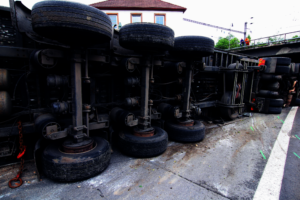Commercial trucking companies bear a significant responsibility for ensuring the safety and integrity of their fleets. Negligence on the part of these companies can have severe consequences, often leading to catastrophic accidents and devastating injuries. There are many ways a trucking company can be held responsible for their negligence, including negligent hiring practices, inadequate training, and the failure to enforce safety regulations.
Negligent Hiring Practices: Screening for Safety on the Roads
Safe and responsible commercial trucking operation carefully selects qualified and competent drivers. The Federal Motor Carrier Safety Regulations (“FMCSRs”) require trucking companies to conduct thorough background checks on potential drivers, including reviewing their past commercial driving history. Failure to uncover red flags, such as a history of accidents, traffic violations, or substance abuse, can be deemed negligent, if not reckless.
Ensuring that truck drivers possess the necessary licenses, certifications, and experience is also crucial. Hiring drivers without the appropriate qualifications may expose the company to liability in the event of a crash. Reviewing a driver’s safety record is not only required by the FMCSRs but also essential in gauging their reliability on the road. A trucking company’s failure to assess a driver’s history of accidents or safety violations may give rise to a claim against the company for negligent hiring or retention.
For a free legal consultation, call 614-481-6000
Inadequate Training: Equipping Drivers for Safe Operations
Trucking companies, through safety directors and others, are required by the FMCSRs to provide comprehensive training to their drivers, preparing them for the unique challenges of operating commercial vehicles. Inadequate training can lead to catastrophic injuries and/or death. Some important considerations include:
- Hands-On Training: Practical, hands-on training is essential for drivers to master the skills required to safely operate a truck. Cutting corners on training programs may result in drivers who are ill-equipped to handle challenging road conditions.
- Emphasis on Safety Protocols: Training should focus on safety protocols, emergency procedures, and proper vehicle maintenance. Failure to emphasize these critical aspects may be regarded as negligence on the part of the trucking company.
- Ongoing Training and Education: The evolving nature of the trucking industry requires ongoing training to keep drivers abreast of new regulations, technologies, and safety standards. A trucking company’s neglect of continuous education can expose the it to liability.
Failure to Enforce Regulations: The Ripple Effect of Non-Compliance
Trucking companies must adhere to a myriad of federal and state regulations designed to promote safety on the roads. For example, trucking companies must actively monitor and enforce regulations related to driver hours of service. Allowing or encouraging drivers to exceed permissible driving hours may result in the trucking company being held liable for crashes caused by driver fatigue. The FMCSRs also require regular inspections and maintenance to keep commercial vehicles in roadworthy condition. Failing to enforce proper maintenance practices can lead to accidents caused by mechanical failures. Finally, it is crucial for trucking companies to implement disciplinary measures for drivers who violate safety regulations. Companies that overlook or ignore violations may be held liable for accidents caused by drivers with a history of non-compliance.
Click to contact our personal injury lawyers today
Contact Cooper Elliott Truck Crash Lawyers Today
Holding trucking companies accountable for their negligence is imperative to ensuring the safety of our roadways. If you or a loved one has been impacted by a commercial trucking accident where the negligence of the trucking company played a role, our legal team is dedicated to pursuing justice on your behalf. Cooper Elliott is here to provide the support, guidance, and advocacy needed to hold negligent trucking companies responsible for their actions.
Call or text 614-481-6000 or complete a Free Case Evaluation form





































